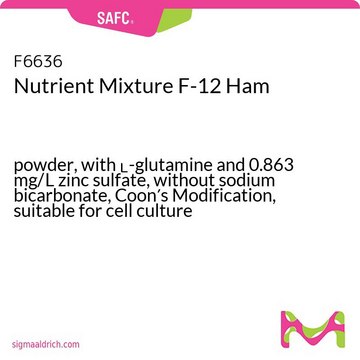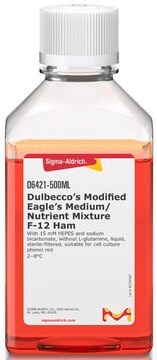51651C
Ham′s Nutrient Mixture F12
liquid
Synonym(s):
Nutrient Mixture F12 Ham’s
About This Item
Recommended Products
description
for research or for further manufacturing use
with 1.0 mM L-glutamine
sterility
sterile
form
liquid
quality
for further manufacturing use
technique(s)
cell culture | mammalian: suitable
components
NaHCO3: 1176 mg/L
sodium pyruvate: 110.1 mg/L
phenol red: 1.274 mg/L
L-glutamine: 146.2 mg/L
shipped in
ambient
storage temp.
2-8°C
Looking for similar products? Visit Product Comparison Guide
Application
supplement
Storage Class Code
12 - Non Combustible Liquids
WGK
WGK 1
Flash Point(F)
Not applicable
Flash Point(C)
Not applicable
Certificates of Analysis (COA)
Search for Certificates of Analysis (COA) by entering the products Lot/Batch Number. Lot and Batch Numbers can be found on a product’s label following the words ‘Lot’ or ‘Batch’.
Already Own This Product?
Find documentation for the products that you have recently purchased in the Document Library.
Customers Also Viewed
Our team of scientists has experience in all areas of research including Life Science, Material Science, Chemical Synthesis, Chromatography, Analytical and many others.
Contact Technical Service





